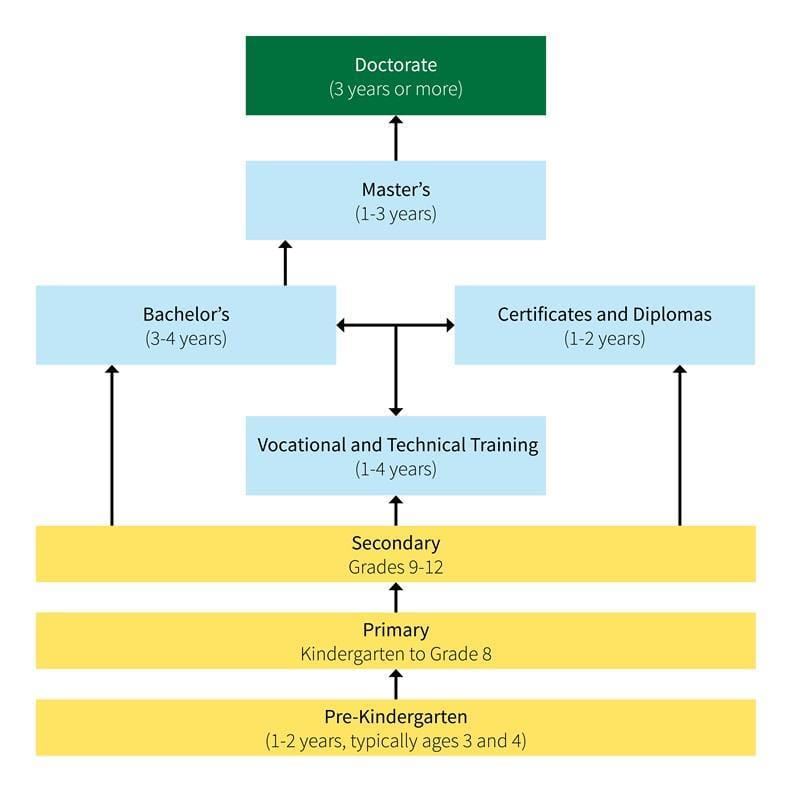Saskatchewan is full of opportunities for study, quality careers and entrepreneurship. Our economy is growing – we are a leader in Canada. These opportunities along with our safe and friendly communities, competitive cost of living and the natural beauty of our prairie, lakes and forests, result in a high quality of life that students from around the world are enjoying when they come to study in Saskatchewan.
High Quality and Affordable Education
Saskatchewan offers high-quality, affordable education. Our Prekindergarten to Grade 12 system provides a well-rounded educational foundation that prepares students for a successful future. Our universities, colleges and technical institutes offer a wide range of courses and credentials from trade certifications to doctoral degrees. We have state-of-the-art research and innovation facilities and top-quality educators, which attract international students from around the world. The application process and fees vary by post-secondary educational institution, so you should check with each institution for the specific information you need.
Post-Secondary Educational Institutions
There are several types of post-secondary educational institutions in Saskatchewan including:
Universities
Saskatchewan has two world-class, publicly funded, government-accredited universities that attract international students from many countries around the world:
- The University of Regina is a dynamic institution with 10 faculties and 25 academic departments, which have established reputations for excellence and innovative programs leading to bachelor's, master's and doctoral degrees.
- The University of Saskatchewan is a member of U15, a group of top research universities in Canada. It offers 58 kinds of degrees, diplomas and certificates at bachelor, master and doctoral levels in over 100 program areas.
Both universities offer English as a Second Language (ESL) through a number of supportive, student-centred programs. Visit the University of Regina ESL program or the University of Saskatchewan Language Centre to learn more.
Polytechnics
Polytechnics provide people with applied learning opportunities, equipping them with marketable knowledge and skills that businesses and industry need to grow.
Saskatchewan Polytechnic is a member of Polytechnics Canada. It is Saskatchewan's primary post-secondary institution for technical education and skills training. It offers 150 certificate, diploma and degree programs and serves students through campuses in Moose Jaw, Prince Albert, Regina and Saskatoon, as well as distance education.
Regional Colleges
Saskatchewan's regional colleges offer courses and programs in trades, skills training and academic studies leading to certificates, diplomas and degrees. They also provide adult basic education to prepare adult learners for post-secondary studies. Many regional colleges offer programs linked to Saskatchewan Polytechnic and first year university classes that allow students to transfer into one of our universities.
Carlton Trail College, Great Plains College, North West College, Southeast College and Suncrest College* are designated to provide programs for international students. Visit their websites to learn more.
Private Vocational Schools
Private Vocational Schools, also known as career colleges, offer non-degree, vocational training programs in Saskatchewan to prepare students for employment in a specific occupation. Programs are available in a variety of areas including business, healthcare careers, fashion design, and office administration.
Pathways for Post-Secondary Education

Saskatchewan's flexible post-secondary system offers a variety of pathways for students.
- Students could choose to take diploma, certificate or degree programs at one institution.
- Students could choose to start a degree at one institution and then finish it at another (for example, students could start at a regional college and then transfer to one of the universities).
- Students could complete a full degree at one institution then add a diploma or certificate from another institution to build more specific and practical skills.
Study Permits
To study in Canada, you usually need a study permit or a temporary resident visa; however, not everyone must have these documents. Visit Get a Study Permit on Immigration, Refugees and Citizenship and Immigration Canada's (IRCC) website to find out what requirements you must meet in order to study in Saskatchewan.
Students can apply for a study permit once they are accepted by a designated learning institution and have received their corresponding provincial attention attestation letter from the Government of Saskatchewan. A complete list of post-secondary institutions designated in Saskatchewan to host international students is available on IRCC’s website.
As of January 22, 2024, IRCC requires most students to include a provincial attestation letter (PAL) from the province or territory where they plan to study when applying for their study permit. Saskatchewan has been allocated just over 17,600 PALs to distribute to future undergraduate and graduate international students in 2025.
A study permit is not needed if you want to take short-term courses or programs of study of six months or less. You may enrol in short term programs at any learning institution, regardless of whether or not it is designated.
For more information on Saskatchewan study permit requirements, visit our Study Permits page.
For more information on studying in Canada, please visit the Government of Canada's Study in Canada section.
Supports and Services
International students can access settlement services free of charge to make a more successful transition to life in Saskatchewan. Find newcomer services near you to learn more.
Leisure Activities
Besides your study, there are many things to do and places to explore that will make your experience in Saskatchewan wonderful. Visit Tourism Saskatchewan to find out more.

